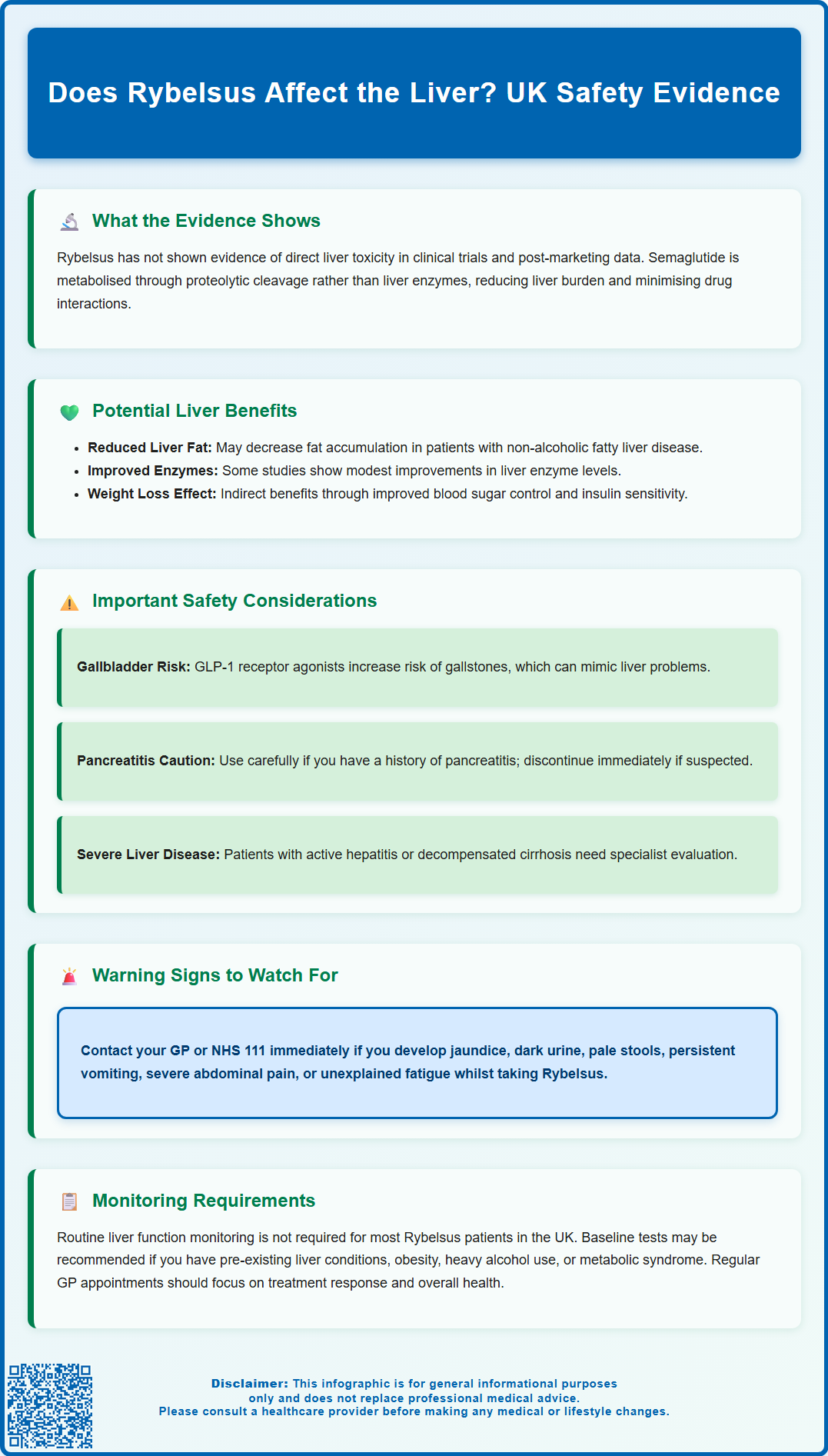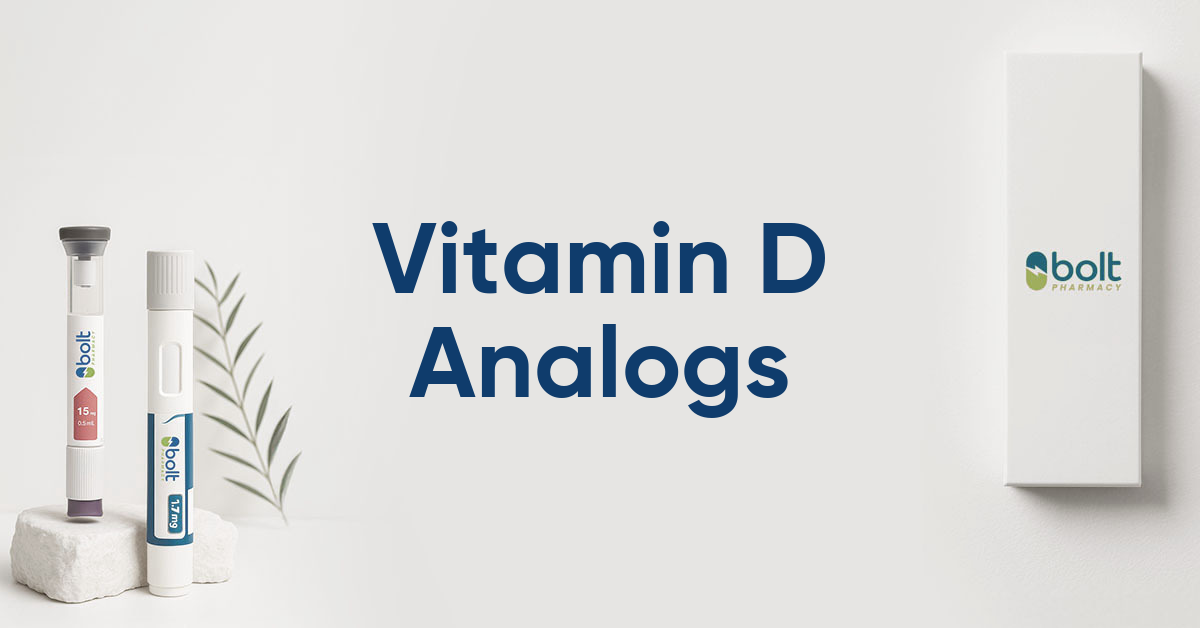Rybelsus (semaglutide) is an oral GLP-1 receptor agonist licensed in the UK for type 2 diabetes mellitus. Many patients and clinicians ask: does Rybelsus affect the liver? Current evidence indicates that Rybelsus does not typically cause direct liver toxicity. Clinical trials have not identified hepatotoxicity as a characteristic adverse effect, and the medication is metabolised via pathways that place minimal burden on hepatic enzyme systems. However, GLP-1 receptor agonists are associated with increased gallbladder disease risk, which can mimic liver problems. Interestingly, Rybelsus may indirectly benefit liver health by improving glycaemic control and promoting weight loss in patients with concurrent non-alcoholic fatty liver disease.
Summary: Rybelsus (semaglutide) does not typically cause direct liver toxicity and is not associated with hepatotoxicity in clinical trials.
- Semaglutide is metabolised via proteolytic cleavage and beta-oxidation, not hepatic cytochrome P450 enzymes, reducing liver burden.
- GLP-1 receptor agonists including Rybelsus are associated with increased risk of gallbladder disease such as gallstones.
- No dose adjustment is required for hepatic impairment, though experience in severe hepatic impairment is limited.
- Routine liver function monitoring is not required unless pre-existing liver conditions or clinical concerns exist.
- Patients should seek urgent medical attention for jaundice, persistent nausea, dark urine, or severe abdominal pain.
Table of Contents
Does Rybelsus Affect the Liver?
Rybelsus (semaglutide) is an oral glucagon-like peptide-1 (GLP-1) receptor agonist licensed in the UK for the treatment of type 2 diabetes mellitus. As with any medication, patients and healthcare professionals naturally question its safety profile, particularly regarding potential effects on vital organs such as the liver.
The current evidence suggests that Rybelsus has not shown a signal for direct liver toxicity in most patients. Clinical trials and post-marketing surveillance data have not identified hepatotoxicity as a characteristic adverse effect of semaglutide, though rare idiosyncratic reactions cannot be completely excluded, as with any medicine.
It is important to note that GLP-1 receptor agonists, including semaglutide, are associated with an increased risk of gallbladder disease (such as gallstones), which can sometimes present with symptoms resembling liver problems, including jaundice or abnormal liver function tests.
Interestingly, Rybelsus may indirectly influence liver health in positive ways for some patients. Many people with type 2 diabetes also have non-alcoholic fatty liver disease (NAFLD), a condition closely linked to insulin resistance and obesity. By improving glycaemic control and promoting weight loss—two established benefits of GLP-1 receptor agonists—Rybelsus may help reduce hepatic fat accumulation in some individuals, although it is not licensed for the treatment of NAFLD.
Patients should remain vigilant for symptoms that might suggest liver or gallbladder problems, such as persistent nausea, jaundice (yellowing of the skin or eyes), dark urine, or unexplained fatigue. If such symptoms develop, it is essential to contact your GP or NHS 111 promptly for assessment.

Liver Function and Rybelsus: What the Evidence Shows
The pharmacological profile of semaglutide provides reassurance regarding hepatic safety. Semaglutide is primarily metabolised via proteolytic cleavage and beta-oxidation, pathways that do not heavily rely on hepatic cytochrome P450 enzymes. This metabolic route reduces the likelihood of drug-drug interactions and minimises the burden on liver enzyme systems, which is particularly relevant for patients taking multiple medications.
Clinical trial data from the PIONEER programme—which evaluated oral semaglutide across diverse patient populations—did not demonstrate clinically significant elevations in liver transaminases (ALT and AST) compared to placebo or active comparators. Some studies have shown modest improvements in liver enzyme levels among participants treated with semaglutide, likely reflecting improvements in metabolic health.
Research examining GLP-1 receptor agonists in patients with NAFLD has yielded encouraging results. Some studies suggest that GLP-1 receptor agonists may reduce liver fat content and improve markers of liver inflammation. These benefits appear to be mediated through weight loss and improved insulin sensitivity. However, it's important to emphasise that Rybelsus is not licensed for the treatment of NAFLD or liver conditions.
There is no established causal link between Rybelsus and acute liver failure or chronic liver disease in the published literature, though rare cases cannot be excluded. Routine liver function monitoring is not mandated by UK prescribing guidelines for patients taking Rybelsus, unless there are other clinical indications. Baseline liver function tests may be considered in patients with known liver disease or risk factors, with subsequent monitoring determined by the clinician based on individual patient circumstances.
Who Should Avoid or Use Rybelsus with Caution
While Rybelsus is generally well-tolerated, certain patient groups warrant careful consideration before initiating treatment. According to the Summary of Product Characteristics (SmPC), no dose adjustment is required for patients with hepatic impairment, though experience is limited in patients with severe hepatic impairment.
Individuals with active liver disease, such as acute hepatitis or decompensated cirrhosis, should be assessed on a case-by-case basis. While there is no evidence that Rybelsus worsens liver function, the presence of significant hepatic compromise may affect overall clinical stability. In such cases, specialist input is advisable.
Patients with a history of pancreatitis should use Rybelsus with caution. The SmPC notes that cases of acute pancreatitis have been reported with GLP-1 receptor agonists. If pancreatitis is suspected, Rybelsus should be discontinued. Although pancreatitis primarily affects the pancreas rather than the liver, severe cases can lead to systemic complications.
Patients should be aware of the risk of gallbladder disease with GLP-1 receptor agonists, including gallstones (cholelithiasis). Symptoms such as severe upper abdominal pain, often radiating to the back or shoulder, may indicate gallbladder problems and should prompt medical attention.
Additionally, individuals taking multiple medications should discuss their complete medication list with their GP or diabetes team. While drug-drug interactions involving Rybelsus are uncommon, a comprehensive medication review ensures safe prescribing practices. Always inform your GP or diabetes specialist about all medications and supplements you are taking.
Monitoring Your Liver Health While Taking Rybelsus
For most patients taking Rybelsus, routine liver function monitoring is not required unless there are pre-existing liver conditions or other clinical concerns. Monitoring should be based on individual risk factors and clinical judgement rather than a fixed schedule.
If you have known liver disease or risk factors such as obesity, excessive alcohol consumption, or metabolic syndrome, your GP may recommend baseline liver function tests (LFTs) before starting Rybelsus. These typically include measurements of alanine aminotransferase (ALT), aspartate aminotransferase (AST), alkaline phosphatase (ALP), and bilirubin. Any subsequent testing would be arranged based on clinical need rather than routine intervals.
Symptoms that should prompt immediate medical attention include:
-
Persistent nausea or vomiting that does not improve
-
Jaundice (yellowing of the skin or whites of the eyes)
-
Dark-coloured urine or pale stools
-
Unexplained fatigue or weakness
-
Right upper abdominal pain or discomfort
-
Severe abdominal pain that may radiate to the back (possible gallbladder disease)
-
Easy bruising or bleeding
These symptoms may indicate liver dysfunction, gallbladder problems, or other serious conditions requiring urgent evaluation. Contact your GP or NHS 111 urgently if you experience any of these warning signs.
In line with NICE guidance on diabetes management, regular review appointments with your GP or diabetes nurse should include assessment of overall treatment response, side effects, and any changes in your health status. This holistic approach ensures that any potential concerns are identified and addressed promptly.
If you suspect you are experiencing a side effect from Rybelsus, you can report this through the MHRA Yellow Card Scheme, which helps monitor the safety of medicines in the UK. Maintaining a healthy lifestyle, including a balanced diet, regular physical activity, and moderation of alcohol intake, further supports liver health and optimises the benefits of Rybelsus therapy.
Frequently Asked Questions
Does Rybelsus cause liver damage?
Current evidence shows that Rybelsus does not typically cause direct liver damage. Clinical trials have not identified hepatotoxicity as a characteristic adverse effect of semaglutide, though rare idiosyncratic reactions cannot be completely excluded.
Do I need liver function tests whilst taking Rybelsus?
Routine liver function monitoring is not required for most patients taking Rybelsus. Baseline tests may be considered if you have known liver disease or risk factors, with subsequent monitoring based on individual clinical circumstances.
Can Rybelsus help with fatty liver disease?
Rybelsus may indirectly benefit patients with non-alcoholic fatty liver disease by improving glycaemic control and promoting weight loss, though it is not licensed for the treatment of NAFLD or liver conditions.
The health-related content published on this site is based on credible scientific sources and is periodically reviewed to ensure accuracy and relevance. Although we aim to reflect the most current medical knowledge, the material is meant for general education and awareness only.
The information on this site is not a substitute for professional medical advice. For any health concerns, please speak with a qualified medical professional. By using this information, you acknowledge responsibility for any decisions made and understand we are not liable for any consequences that may result.
Heading 1
Heading 2
Heading 3
Heading 4
Heading 5
Heading 6
Lorem ipsum dolor sit amet, consectetur adipiscing elit, sed do eiusmod tempor incididunt ut labore et dolore magna aliqua. Ut enim ad minim veniam, quis nostrud exercitation ullamco laboris nisi ut aliquip ex ea commodo consequat. Duis aute irure dolor in reprehenderit in voluptate velit esse cillum dolore eu fugiat nulla pariatur.
Block quote
Ordered list
- Item 1
- Item 2
- Item 3
Unordered list
- Item A
- Item B
- Item C
Bold text
Emphasis
Superscript
Subscript












